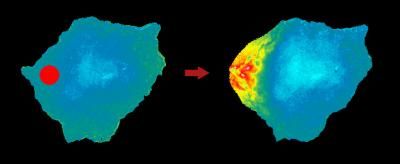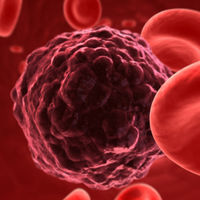Breakthrough uses light to manipulate cell movement
One of the biggest challenges in scientists' quest to develop new and better treatments for cancer is gaining a better understanding of how and why cancer spreads. Recent breakthroughs have uncovered how different cellular proteins are turned 'on' or 'off' at the molecular level, but much remains to be understood about how protein signaling influences cell behavior.

A photoactivatable protein enables control of cell movement in living cells. Activation of Rac in the red circle led to localized cell protrusion and translocation of the kinase PAK to the cell edge (right hand image, Pak in red).
Yi Wu, UNC-Chapel Hill.
A new technique developed by Klaus Hahn, Ph.D. and his colleagues uses light to manipulate the activity of a protein at precise times and places within a living cell, providing a new tool for scientists who study the fundamentals of protein function.
In a paper published in Nature, Hahn, who is the Thurman Professor of Pharmacology at the University of North Carolina at Chapel Hill and a member of UNC Lineberger Comprehensive Cancer Center, described the technique, which uses light to control protein behavior in cells and animals simply by shining light on the cells where they want the protein to be active.
"The technology has exciting applications in basic research – in many cases the same protein can be either cancer-producing or beneficial, depending on where in a cell it is activated. Now researchers can control where that happens and study this heretofore inaccessible level of cellular control," said Hahn.
"Because we first tested this new technology on a protein that initiates cell movement, we can now use light to control where and how cells move. This is quite valuable in studies where cell movement is the focus of the research, including embryonic development, nerve regeneration and cancer metastasis," he added.
The new technology is an advance over previous light-directed methods of cellular control that used toxic wavelengths of life, disrupted the cell membrane or could switch proteins 'on' but not 'off'.
Most read news
Topics
Organizations
Other news from the department science

Get the life science industry in your inbox
By submitting this form you agree that LUMITOS AG will send you the newsletter(s) selected above by email. Your data will not be passed on to third parties. Your data will be stored and processed in accordance with our data protection regulations. LUMITOS may contact you by email for the purpose of advertising or market and opinion surveys. You can revoke your consent at any time without giving reasons to LUMITOS AG, Ernst-Augustin-Str. 2, 12489 Berlin, Germany or by e-mail at revoke@lumitos.com with effect for the future. In addition, each email contains a link to unsubscribe from the corresponding newsletter.





















































